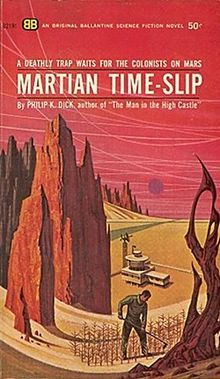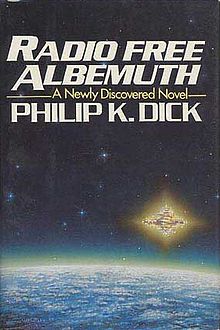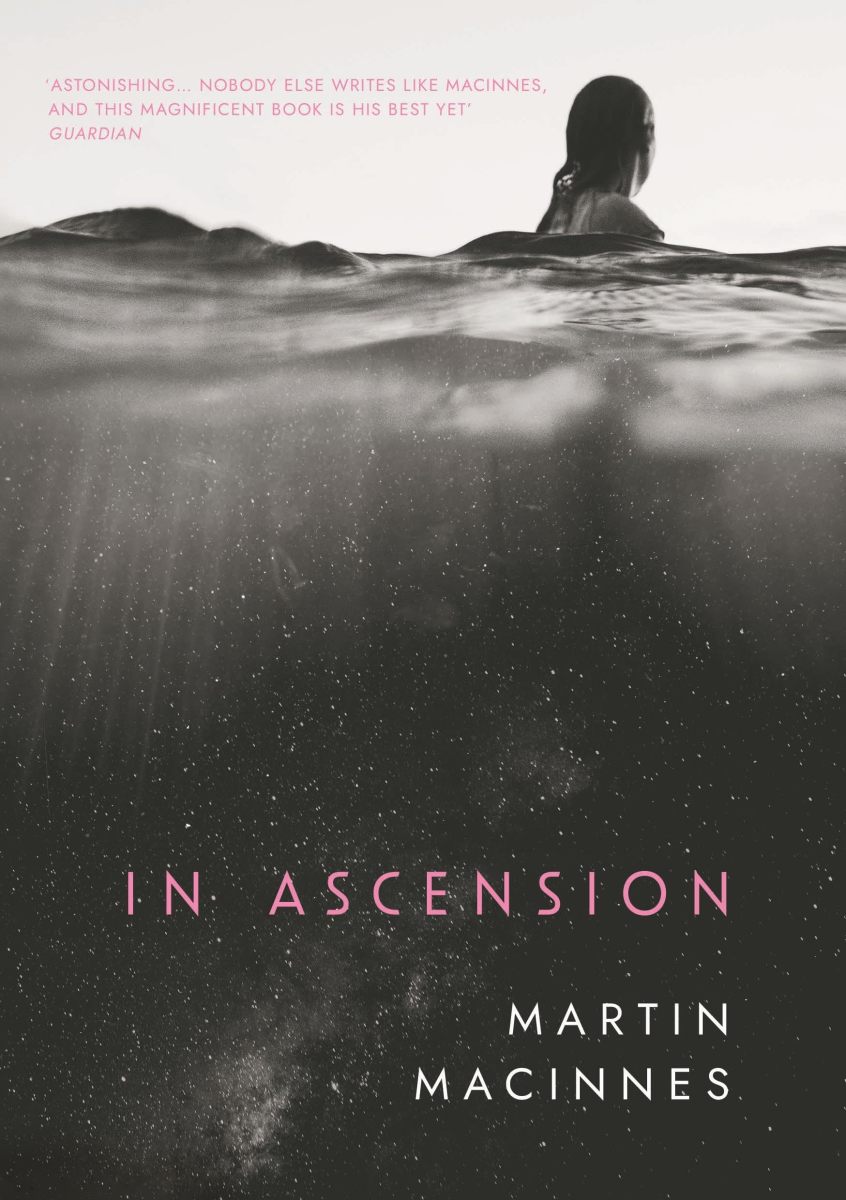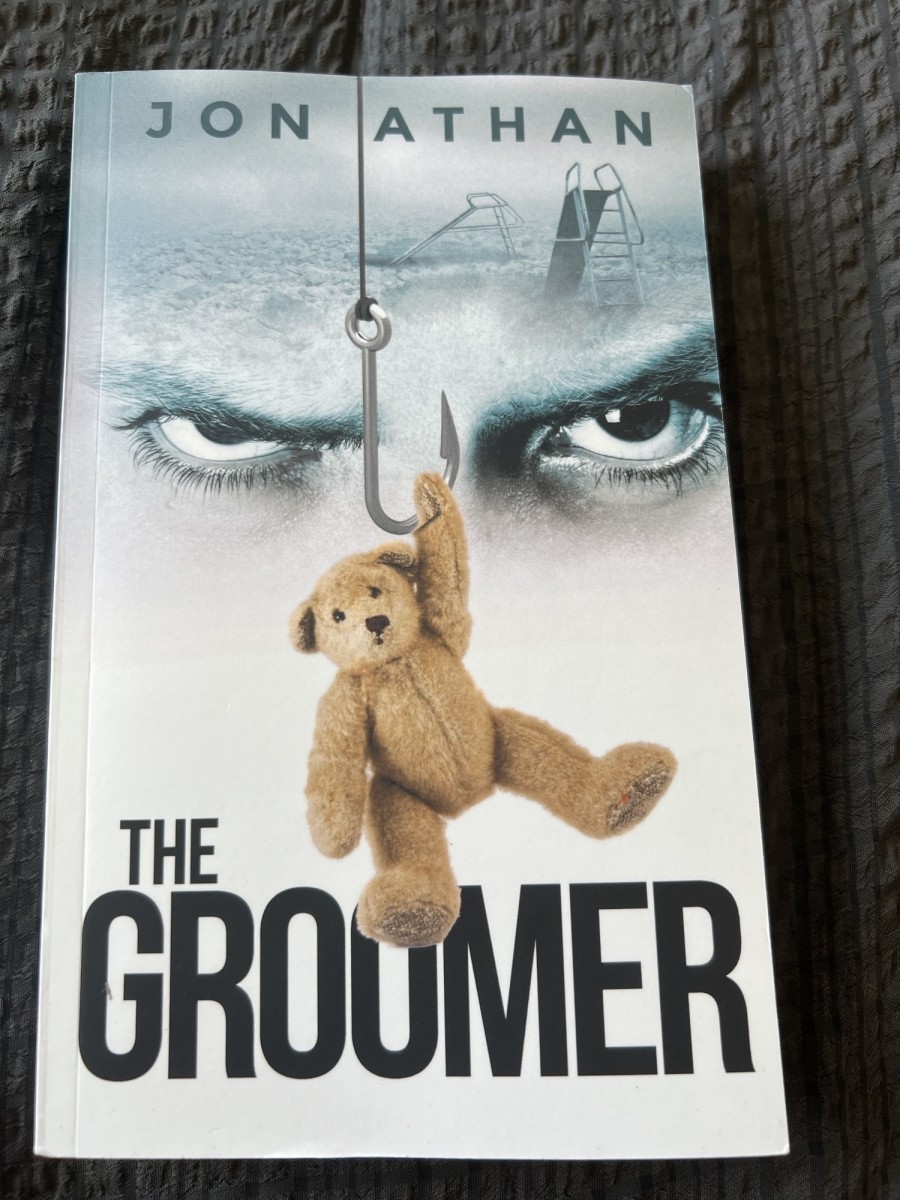Three-Book Review: Philip K. Dick: Flow My Tears, The Policeman Said; Martian Time-Slip; Radio Free Albemuth

Flow My Tears, The Policeman Said
We have here a Vintage Books paperback of 229 pages. The very first Vintage Books edition was put out in July of 1993. Vintage Books is a division of Random House, Inc. The book was originally published in 1974 under the copyright of Philip K. Dick.
From the back cover
"On October 11 the television star Jason Taverner is so famous that 30 million viewers eagerly watch his prime-time show. On October 12 Jason Taverner is not a has-been but a never-was---a man who lost not only his audience but all proof of his existence. And in the claustrophobic betrayal state of Flow My Tears, The Policeman Said, loss of proof is synonymous with loss of life.
"As Taverner races to solve the riddle of his 'disappearance,' Philip K. Dick immerses us in a horribly plausible United States in which everyone---from a waiflike forger of identity cards to a surgically altered pleasure queen---informs on everyone else, a world in which even the omniscient police have something to hide. His bleakly beautiful novel bores into the deepest bedrock of the self and plants a stick of dynamite at its center."
Frankly, I am trying to think of what to say to prepare you for this novel, if you are not familiar with the work of Philip K. Dick. I will start by saying that I have often found it to be the case that many of his novels and stories turn out to have been prescient; that is to say, both relevant to the time he was writing in, as well as relevant for our present, which would have been his "future," several decades later.
I should also say that one of Philip K. Dick's most important themes is the nature of reality. In exploring the subject, he presents fascinating and entertaining fictional variations on the texture of reality. That is to say, he gives the reader many cool and funky ways reality might unfold.
I know that is still not clear; but if you get into the work of Philip K. Dick, you will see how hard it is to neatly categorize his fiction. But let me put it this way. Philip K. Dick, himself, gave definitions of science fiction and fantasy. He called fantasy stories about that which cannot happen, it is impossible that such events could ever take place.
Mr. Dick referred to science fiction as stories about that which could possibly happen under the right circumstances.
Okay, here is how you can understand what this novel's story does. Let's suppose there is this obsessive-compulsive fan, a bit of a psychotic. Let us also suppose he obsesses over a female news anchorperson, or "news reader," as I believe they say in Britain.
Let's say the psychotics obsession grows, in the "classical" sense, that he comes to believe that, through the television screen, thousands of miles away, "she is talking only to me," and all that good stuff. He believes she can see him, through the television screen, from hundreds of thousands of miles away.
The psychotic comes to believe that she is "flirting" with him, again, through the television screen, hundreds or thousands of miles away. The psychotic comes to believe that "she loves me," and that he has fallen in love with her. This means, of course, to the psychotic's warped mind, that they "ought to be together."
The psychotic comes to believe he owns her, the female news reader, with whom he has fallen in love over the television screen, from hundreds or thousands of miles away. The psychotic makes preparations for the two of them to "be together forever."
Now, these are usually the ingredients of a scary crime thriller or work of what they call "psychological suspense," or something like that. In other words, this is the kind of thing we would usually expect from writers like, say, Dean Koontz, Stephen King, James Patterson, Harlan Coben, Mary Higgins Clark, and so on.
But we are talking about Philip K. Dick. What turns this novel from being a genre "crime thriller" or "suspense" kind of book is the science fictional means by which the psychotic actually has at her disposal to get the job done.
The psychotic, obsessive-compulsive fan usually wants to possess his idol. Her fame drew him to her; but once he gets his hands on her, he wants her to be his and his alone. In Flow My Tears, The Policeman Said, the obsessive-compulsive, psychotic fan ACTUALLY has a way to accomplish this, with absolutely no fear that anyone would even be looking for such a big star with 30 million viewers.
I don't want to give the plot away, but I will give you two keys to the story. As you read this book I want you to be on the look out for: 1) the psychotic fan; and 2) parallel universes without parallel versions of "You." You remember the Jet Li film, The One?
It was about a former cop on the "multiverse" beat. One day he had to kill a version of "himself" in another dimension, in self-defense. He found that this increased his strength (not unlike Highlander). Now he deliberately hops from dimension to dimension, killing versions of himself in order to increase his strength.
Anyway, in Philip K. Dick's novel of the multiverse, Flow My Tears, The Policeman Said, there is no such person-to-person equivalency. Just remember that and then hold on for a wild ride.

Martian Time-Slip
The version of this book I'm looking at, is a paperback of 262 pages. It is published by Vintage Books (a division of Random House, Inc.). The first Vintage Books edition was put out in June of 1995. The book was originally published in 1964 under the copyright of Philip K. Dick.
From the back cover
"On the arid colony of Mars the only thing more precious than water may be a ten-year-old schizophrenic boy named Manfred Steiner. For although the UN has slated 'anamalous' children for deportation and destruction, other people --- especially Supreme Goodmember Arnie Kott of the Water Workers' Union --- suspect that Manfred's disorder may be a window into the future.
"But what sort of future? And what happens to those unfortunates who Manfred ushers into it? In Martian Time-Slip, Philip K. Dick, the incomparable genius of speculative fiction, uses power politics and extraterrestrial real estate scams, and murder to penetrate the mysteries of being and time."
I don't want to give the plot of the story away, of course. I will only say this: There is one great "truth" that emerges from this novel, for me.
Let's say that time travel exists. Let's also say that it is possible to travel backward into the past. Let us also suppose that you wanted to go back into the past to correct a mistake you made, either do something you "should have" done, or not do something you "shouldn't have" done.
You should not expect the backward trip in time to be like a mulligan in golf. You see, an insight I got from this story is that for an individual to go back in time, it is, in a sense, to carry the whole world back in time with you.
That is to say, other people will act differently as you act differently. And why should it be any different? In other words, you should not expect for people "in the past" to obligingly do and act exactly as they had when you first passed through, so that you can conveniently make your "correction."
Can you imagine the chaos if reality turned out to be so malleable? If time travel were ever invented and it actually became possible to travel back into the past? And if time travel were, God forbid, widely available, perhaps available to the rich more so than other people?
And if it were possible for individuals to travel back into their pasts and take their "mulligans"? Old fashioned cheating would become obsolete --- but it really wouldn't matter much, I think. Just think of the test scores that would be adjusted by ambitious sons and daughters of ambitious (and ambitious for their children) and rich parents. Just think of what it would do to the stock market; classical insider trading would not be necessary.
Just think of all the athletes who would go back and adjust their outcomes in athletic competitions.
Remember, I'm supposing that not only backward time travel was possible; but also the ability to take "mulligans," without causing the people in the past to act in a corresponding, counteracting way!
If such were the case, I think this would most certainly result in an unstable, untenable present. It seems to me that such a state of affairs would force into existence a "multiverse," where all outcomes are played out, with various versions of "You," experiencing those various outcomes.
But on the other hand, suppose A and B have a professional boxing match. A wins and B loses. Suppose B just went back in time and arranged to win. The new reality has B as the winner and A as the loser.
Suppose A went back into time now and arranged to win (again). Suppose this went on and on. Wouldn't you have a scenario in which the cat is endlessly chasing his own tail? Time might never move forward again.

Radio Free Albemuth
Vintage Books, a division of Random House, Inc., brings to us this paperback of 214 pages. The fist Vintage Books edition was put out in April of 1998. The novel was originally published in 1985, under the copyright of the estate of Philip K. Dick.
From the back cover
"In the late 1960s a paranoid incompetent has schemed his way into the White House and convulsed America in a vicious war against imaginary internal enemies. A struggling science fiction writer named Philip K. Dick is trying to keep from becoming one of that war's casualties. And Dick's best friend, a record executive named Nicholas Brady, is receiving transmissions from an extraterrestrial entity that may also happen to be God --- an entity that apparently wants to over overthrow the President.
"In this, his last novel, Philip K. Dick morphed and recombined themes that had informed his fiction from A Scanner Darkly to Valis and produced a wild, impassioned work that reads like a visionary alternate history of the United States. Agonizingly suspenseful, darkly hilarious, and filled with enough conspiracy theories to thrill the most hardened paranoid, Radio Free Albemuth is proof of Dick's stature as our century's greatest prankster-prophet."
Did you ever see the movie, Mission To Mars with Gary Sinise and Don Cheadle? If you have, you know how it ends. The astronauts meet up with a Martian, who, naturally cannot speak English. But the Martian manages to convey--- by way of a kind of PowerPoint presentation--- to the Earthlings that they, the Martians, are the genetic parents of all life on Earth.
That is to say, "they seeded the Earth," Don Cheadle said, awe-struck. "They are us and we are them," Gary Sinise added wisely.
The story of Radio Free Albemuth is a variation on that theme. However, the alien benefactors in Philip K. Dick's book, are never physically revealed.
The other difference is that in Mr. Dick's novel it is never suggested that we owe our bodies to alien progeniture. But it is implied that we owe our intellectual outlook and culture to alien-to-human mental contact, facilitated by satellite.
The idea is even floated that the original Garden of Eden was more like a state of mind, in which human beings had, once upon a time, enjoyed steady, uninterrupted mental contact with the wise and compassionate aliens. It seems, according to this idea, that the Fall from grace was what occurred when human mental contact with the aliens via the satellite was cut off.
This had once been a general human condition, communion with the aliens by mind-to-mind contact, by way of the satellite. But now it isn't. The handful of individuals who do experience this contact, these days, are considered crazy----but not for the reason you think!
Thank you for reading!








